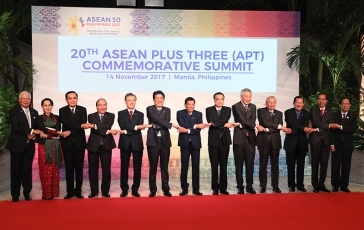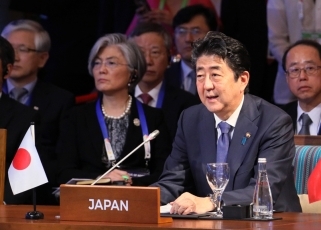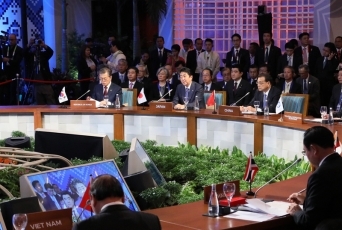Japan-ASEAN Relations
20th ASEAN Plus Three (Japan-China-Republic of Korea) Summit Meeting
November 14, 2017
 Photo: Cabinet Public Relations Office
Photo: Cabinet Public Relations Office
 Photo: Cabinet Public Relations Office
Photo: Cabinet Public Relations Office
 Photo: Cabinet Public Relations Office
Photo: Cabinet Public Relations Office
On November 14, from 9:20 a.m. to 10:40 a.m., the ASEAN Plus Three Summit was held in Manila, the Republic of the Philippines. Mr. Shinzo Abe, Prime Minister of Japan, attended and co-chaired the meeting. The overview of the meeting is as follows, with a focus on statements by Prime Minister Abe.
1 Opening remarks
Following the statement by H.E. Mr. Rodrigo R. Duterte, President of the Republic of the Philippines, Prime Minister Abe stated the following.
- This is an important year that marks the 20th anniversary of the establishment of the ASEAN Plus Three. The ASEAN Plus Three was established in the wake of the Asian Currency Crisis in 1997, and since then, its scope of cooperation has been broadened to include food security, energy, environment, and health, among others.
- I welcome the fact that this year, the Manila Declaration on the 20th Anniversary of ASEAN Plus Three Cooperation was agreed and at the Foreign Ministers’ Meeting in August, the ASEAN Plus Three Cooperation Work Plan (2018-2022) was adopted.
- In the midst of concerns on the rise of protectionism and an inward-looking sentiment in the world, it is important to further strengthen the Chiang Mai Initiative (CMI) and the ASEAN+3 Macroeconomic Research Office (AMRO) in order to increase the predictability of regional and world economic trends, reduce vulnerabilities, as well as maintain and strengthen the free trade system. We will continue our efforts to make AMRO an even more trustworthy presence for the international community.
- I appreciate the significance of adoption of the ASEAN Plus Three Leaders’ Statement on Food Security Cooperation. Japan provided rice to Laos, Myanmar, and the Philippines again this year through the ASEAN Plus Three Emergency Rice Reserve Agreement.
- More than six years have passed since the Great East Japan Earthquake. Based on scientific evidence, we strongly request the elimination of import restrictions on Japanese food products.
2 Review of ASEAN Plus Three cooperation and its future direction
Prime Minister Abe explained the following seven points, mainly on Japan’s efforts concerning ASEAN Plus Three cooperation.
- In order to further strengthen unity within the ASEAN Plus Three, which is marking the 20th anniversary of its establishment, Japan will contribute to the enhancement of connectivity in the Indo-Pacific region under the Free and Open Indo-Pacific Strategy by combining support for “hard” aspects such as infrastructure development and support for “soft” aspects such as human resources development.
- Under the “Expanded Partnership for Quality Infrastructure”, Japan will contribute promoting quality infrastructure with in accordance with international standards such as openness, transparency, economic efficiency of infrastructure and financial viability of the recipient countries.
- An agreement was reached at the ministerial level on the Trans-Pacific Partnership (TPP) in Da Nang. An agreement in principle has just been reached in the Trans-Pacific Partnership (TPP) negotiations, with Japan leading the discussions. We will actively contribute to the conclusion of a high-quality Regional Comprehensive Economic Partnership (RCEP) based on the high-standard rules that have been agreed to in TPP.
- Strengthening regional energy security is also important for sustainable development. In particular, to promote LNG utilization in Asia, we will engage in the capacity building, including for the establishment of laws and regulation for LNG in ASEAN member countries, and provide USD 10 billion in financial support using public and private sector funds.
- The destruction of the environment as the consequence of economic development is our serious concern. Japan will pursue quality environmental infrastructure through the ASEAN-Japan Environmental Cooperation Initiative utilizing other institutions such as Economic Research Institute for ASEAN and East Asia (ERIA), towards the realization of sustainable cities. In addition, we will contribute to disaster risk reduction through the newly-established Southeast Asia Disaster Risk Insurance Facility (SEADRIF).
- As for enhancing people-to-people connectivity, we will engage in the development of high-level human resources and promote their circulation between Japan and ASEAN through providing opportunities such as graduate study and internships in Japan under the “Innovative Asia” Initiative launched this year. Japan is also leading ASEAN Plus Three cooperation in higher education through the Working Group on Mobility of Higher Education and Ensuring Quality Assurance of Higher Education among ASEAN Plus Three Countries and other efforts. Japan will also promote collaboration between ASEAN Cities of Culture and East Asiana Cultural Cities based on the “Kyoto Declaration 2017”.
- For tackling the challenge of the aging societies in the region, this year, Japan proposed the Asia Health and Wellbeing Initiative, which is aimed at enhancing the quality of life of the elderly throughout Asia. Japan has been promoting the development of human resources for medical and elderly care, and local medical and elderly care services.
3 Regional and international affairs
Prime Minister Abe stated the following.
- North Korea persistently continues to pursue its nuclear and missile development programs. Even if we seek dialogue with North Korea under the current circumstances, we cannot expect to achieve meaningful dialogue. Bearing in mind that North Korea committed to abandoning its nuclear program under the 1994 Agreed Framework between the United States and North Korea as well as the 2005 Joint Statement of the Fourth Round of the Six-Party Talks and yet betrayed us, we should not seek dialogue but instead should maximize pressure to corner North Korea so that it will abandon its nuclear and missile development programs and then ask for dialogue.
- We welcome concrete efforts of China to implement the United Nations Security Council resolutions, including the prohibition of imports of coal, seafood, and textiles products from North Korea. Japan, China, the Republic of Korea, and ASEAN, who are in the same region as North Korea, have major responsibilities to fulfill. We intend to work together to ensure the full implementation of the United Nations Security Council resolutions and that any loopholes in the sanctions are closed.
- The resolution of the abductions issue as soon as possible is the most important issues of the Abe Administration.

